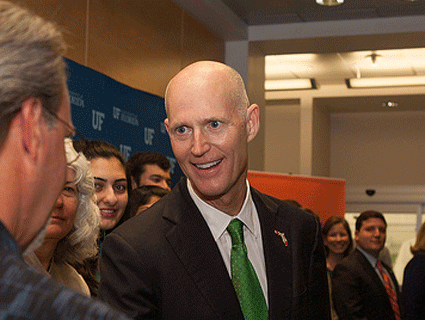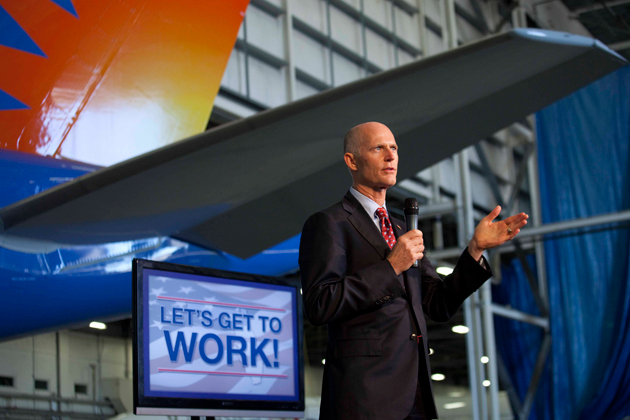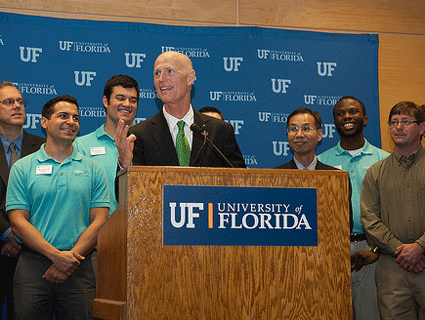
Florida Gov. Rick Scott (R) talking up education spending at the University of Florida.<a href="http://www.flickr.com/photos/flgovscott/8470695883/">FLGovScott</a>Flickr
Florida Governor Rick Scott, one of the nation’s most unpopular governor’s, thanks to his embrace of tea party economics, has been trying hard to overhaul his image in an effort to save his reelection bid next year. He’s suddenly embraced government spending and expressed a new-found love of all the teachers he laid off in his first year in office. But Republicans in the state legislature apparently aren’t keen on seeing Scott reelected. They’re refusing to go along with one of his biggest policy reversals—his embrace of Obamacare. That is going to make it difficult for Scott to complete his metamorphosis into a compassionate conservative.
Elected as a fierce opponent of Obamacare, Scott last month made a complete turnaround and announced that he supported Florida’s participation in the part of Obamacare that expands Medicaid, the government health insurance for the poor, to people making up to 138 percent of the poverty line. That move would extend health care to about 1 million Florida residents. The change of heart wasn’t for humanitarian reasons. Not only might Scott need some of those uninsured people to vote for him, but he made the announcement on Medicaid just hours after the US Department of Health and Human Services said it would allow Florida to shunt most of its Medicaid recipients into private managed care plans. That change will divert millions of dollars for care of the poor into the hands of big insurance companies, many of which can be expected to ante up to support Scott’s reelection bid.
It’s a win-win move for Scott. But there’s just one problem: The Florida legislature, which has to sign off on the Medicaid expansion, wants nothing to do with Obamacare. Tea party Republicans, who dominate the statehouse, voted on Monday to reject the Medicaid expansion because they are still paranoid that the federal government won’t pay for it as required in the law.
House Speaker Will Weatherford said the battle in Washington over automatic budget cuts and taxes proves it would be risky to rely on federal aid.
“I think there’s a lot of uncertainty that is coming from the federal government, and to rely on them to expand the Medicaid program with that uncertainty is a very dangerous path,” said Weatherford, a Republican from Wesley Chapel.
The chairman of the House committee overseeing the bill insisted that Republicans should come up with another way to insure the million people who would miss out on coverage. He didn’t have any idea what that might be, however.
After the vote, state Democrats hissed that Scott was incapable of leading his own party. And not even all the Florida GOP thought rejecting the Medicaid expansion was a good idea. Again, from AP:
Rep. Mike Fasano, R-New Port Richey, said his office receives many calls from single mothers and others who can’t see a doctor because they don’t qualify for Medicaid under the existing criteria, which are among the most stringent in the country.
“By voting to turn back these dollars, this committee has, in essence, told millions of Floridians that they are not worthy of having access to primary health care services,” he said.















